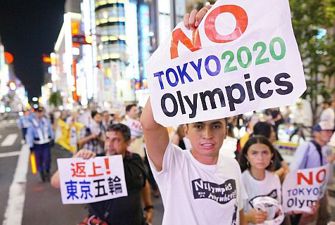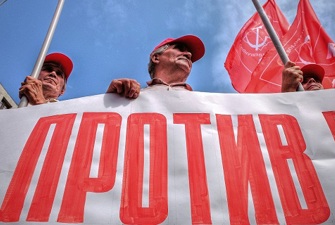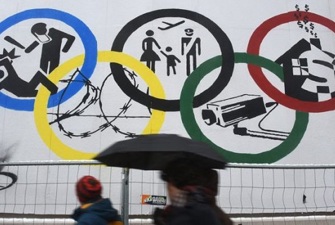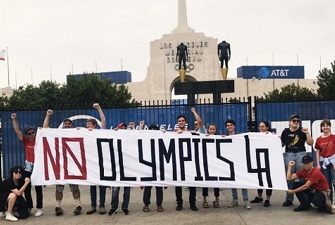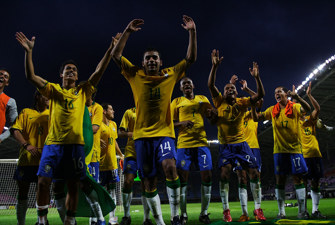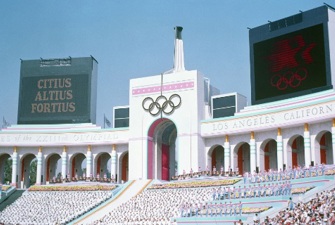Civil society, contestation, and the games
In this first introductory article, Dennis Pauschinger from the University of Neuchâtel and John Lauermann from the City University of New York discuss similarities and differences of the various movements that have arisen and discuss whether it is a global movement, or rather a locally founded ‘globalised way of protesting the World Cup and the Olympics’.
Updated 8 October 2018
Sports mega-events have encountered a wave of contestation in recent years, as citizens and civil society seek greater representation in event planning and management. The Olympic Games and World Cups are high profile examples. Since 2013, at least 13 cities have cancelled their Olympic bids in response to referendums or pressure from civil society activists (see table).
Likewise, recent World Cup and Olympic hosts have experienced protest movements, most notably in Brazil for the 2014 tournament and the 2016 Games. FIFA has also experienced significant political pressure to reform both its internal governance and the way in which it awards hosting contracts. Issues of concern in these recent incidents include the way in which sport governance bodies and local governments organise the events, the heavy investments of public money of later privatised venues, and the often unfulfilled urban legacy promises made by organisers.
Table: Selected cancelled Olympic bids, 2013-2018
| Olympic bid | Protest campaign | Referendum on the bid? |
| Boston 2024 | No Boston Olympics, No Boston 2024 | None |
| Budapest 2024 | Momentum Movement, Együtt (an opposition party) | Bid cancelled before referendum was to be held |
| Graubünden 2022 & 2026 | Kommittee Olympiakritisches Graubünden |
March 2013: 47,3% in favour, 52,7% opposed February 2017:39,9% in favour, 60,1% opposed |
| Innsbruck 2026 | Citizen initiative | October 2017:46,6% in favour, 53,3% opposed |
| Graz/Schladming 2026 | Political opposition pushed for referendum | Bid was cancelled before referendum was to be held. |
| Hamburg 2024 | NOlympia Hamburg |
November 2017: 48,4% in favour, 51,6% opposed |
| Krakow 2022 | Krakow Against the Games, signature campaign for a referendum |
May 2014: 30,28% in favour, 69,72% opposed |
| Munich 2022 | NOlympia Munich |
November 2013: 48,4% in favour, 51,6% opposed (Result from Garmisch-Partenkirchen, three other districs including Munich also voted against) |
| Oslo 2022 | Minority coalition in parliament |
September 2013: 55% in favour, 45% opposed. Bid was withdrawn 2014 |
| Rome 2020 & 2024 | Against the 2024 bid: Five Star Movement; Radicali Italiani; Virginia Raggi mayoral campaign | None |
| Sion 2026 | Verein Nein zu Sion 2026 |
June 2018: 46,0% in favour, 53,9% opposed |
| Stockholm 2022 | Little organized opposition, but weak public support in opinion polls |
None |
| Vienna 2028 |
March 2013: 28% in favour, 72% opposed |
Selected Olympic bids cancelled between 2013-2018 because of political/public opposition. Please note that the table has been updated since the first publication.
These reforms and cancellations are driven by a growing number of protest campaigns, as local communities debate whether or not to host mega-events and as international social movements call for sport governance reforms. These protests have likewise prompted efforts to reform mega-events.
While critics may question the depth of these reforms, these organizations are nonetheless rethinking their relationship with host governments and the citizens they represent. The International Olympic Committee has responded by making greater concessions to host cities – like subsidies for the Paris 2024 and Los Angeles 2028 Olympics – and with reform documents like Olympic Agenda 2020.
FIFA has responded with various initiatives to reform internal governance and increase transparency in World Cup bidding and hosting. And yet again, the sport governance bodies often trigger the protest against their organisations by their very own actions: Lately, FIFA has made news by erasing the word “corruption” from its updated ethic code, introducing a ten year statute of limitation for match fixing and bribes, and introducing punishments for defamation (e.g. by whistleblowers.
An effective model for local campaigns
In our own research, we have analyzed mega-event contestation surrounding recent Olympic bids, including Boston and Hamburg’s bids for the 2024 Summer Olympics, and Sion’s (Switzerland) bid for the 2026 Winter Olympics. We tracked the political campaigns surrounding Olympic bids. In Boston we interviewed anti-Olympic activists and observed dozens of public hearings and rallies. In Hamburg and Sion we did the same, and initiated and participated in public debates surrounding the risks of hosting mega-events.
Our research analyzed recent innovations in protest tactics and strategy by these activists. These innovations are shared across protest movements, as activists travel to each other’s cities (e.g. between Boston and Hamburg, or between Rio and Tokyo), through information clearinghouses like GamesMonitor and NOlympia, and by publishing their own research.
We found that bid protesters have developed an effective model for local campaigns – in the sense that they regularly win referendums and are able to pressure city leaders to withdraw support.
These campaigns are effective for two reasons:
First, they are temporary political actions, which are timed strategically (in our cases, this often means protesting before an Olympic bid has been finalized). As Jules Boykoff of Pacific University documents, such activism is not so much a long term social movement as a “moment of movements” in which pre-existing political communities cooperate.
Second, these campaigns are ideologically diverse, assembling coalitions that include eclectic and sometimes even uncanny alliances including gentrification campaigners, housing affordability advocates, environmental activists, fiscal conservatives, and a variety of locally prominent academics, businesspeople, and elected officials. That ideological diversity allows the protests to build a broad base of support, but can also become a source of conflict within the protest movements.
Difficulties in scaling up
Yet our research also identifies factors that limit the international impact of Olympic bid protests.
These protest campaigns are intensely focused on local issues, which makes them effective at intervening in local political debates (like whether a particular city should bid for the Olympics) but which also makes it difficult to scale up into international organization. The local issues vary from one potential host city to the next and can hardly be generalised, though the campaigns share some common themes by debating topics like cost, public subsidies, and the impacts of hosting on urban quality of life.
Each campaign involves players in different places, adapting to the very local circumstances. Although the local campaigns are successful in their respective cities, the arguments in Boston, Hamburg and Sion had different foci and adapted to the specific bidding plans. This insight is echoed by a number of the campaigners we interviewed, and by a growing academic literature on social movements and sport.
Thus, the protests we observed have not had the power to trigger deeper reforms in the sport governance bodies and have not – at least as of yet – shaped a global anti mega-event movement. Nonetheless, there are elements across all these protest campaigns which unite them and turn them into a global phenomenon: the localness, the focus on issues related to everyday urban life, and a concentration on a shared set of topics which cause continuing problems for sport governance bodies (e.g. scandals, security and surveillance, gentrification, and the financial burden of hosting the games). One could argue that there is no global movement, but that there is a globalized way of protesting the World Cup and the Olympics that adapts to the local conditions in host cities.
This article is the introduction to a series of essays discussing Civil Society, Contestation, and the Games. In subsequent articles, authors will discuss their research on activism surrounding recent mega-events, and the implications for sport governance.
Each article focuses on civil society mobilizations around a particular mega-event, focusing on recent protests surrounding Olympics and World Cups. The articles in the series outline how protest campaigns might effectively engage with international sports governance, and how international authorities might effectively respond to calls for reform. The authors reflect on the challenges of doing research in this much contested field, and on their personal experiences as researchers associated with mega-event planning and pro- and anti- mega-event campaigns.
